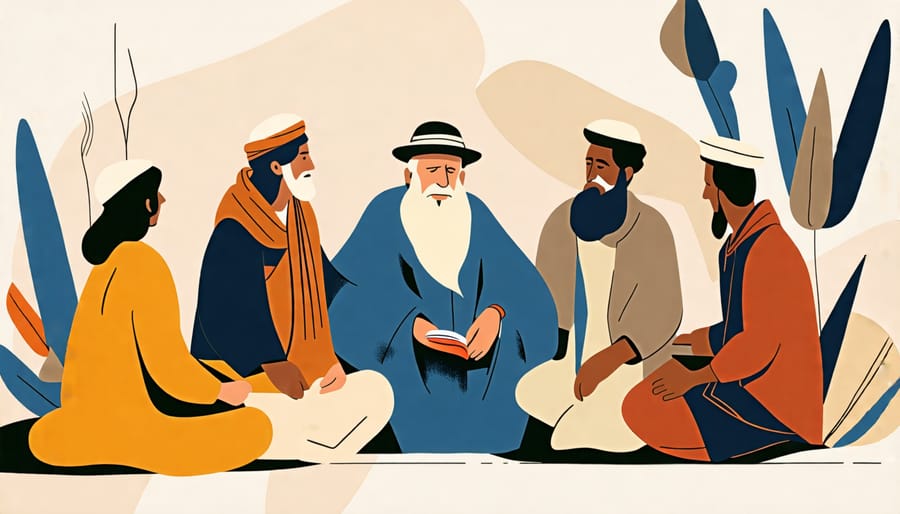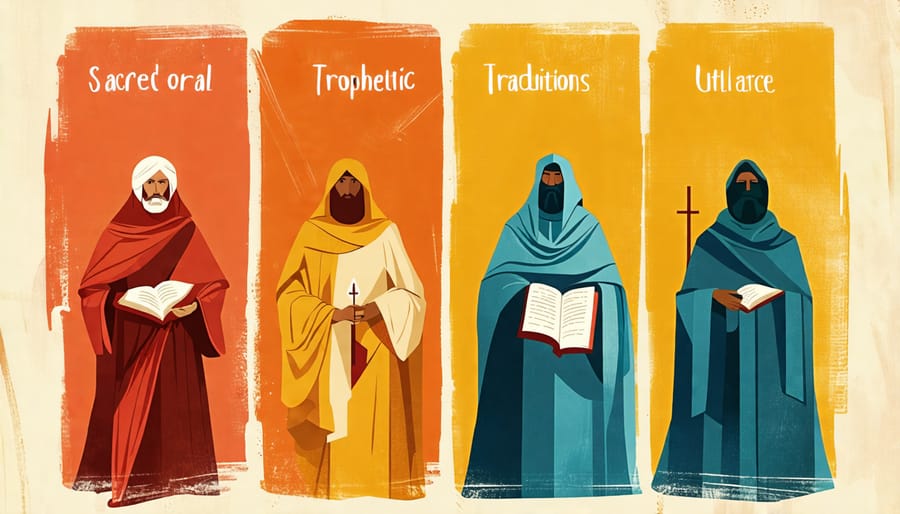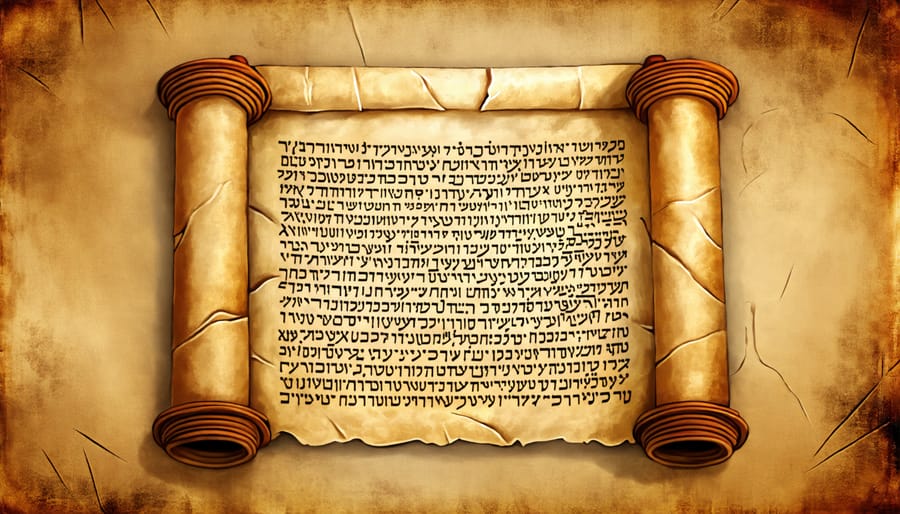Uncover the ancient roots of the Bible through the lens of four powerful oral traditions that shaped the Scriptures we know today. These traditions – the Yahwist, Elohist, Deuteronomist, and Priestly – each contributed unique perspectives and narratives that were eventually woven together into the tapestry of faith. By exploring the historical context and significance of these Christian traditions, we gain a deeper understanding of how God’s Word was transmitted and preserved across generations. Join us on a journey through time as we trace the oral origins of the Bible and discover the rich heritage that underlies our faith.
The Importance of Oral Traditions
Preserving History and Teachings
Oral traditions played a vital role in preserving religious teachings, laws, and historical accounts across generations in ancient Jewish culture. Before the invention of writing, these oral traditions ensured that important knowledge was passed down from one generation to the next. Through storytelling, memorization, and repetition, the Jewish people maintained their religious identity and connection to their history. Parents and elders would teach children the stories of their ancestors, the laws given by God, and the prophetic messages, ensuring that these crucial elements of their faith were not lost over time. This oral transmission allowed for the preservation of the core tenets of Judaism, which would later be recorded in the written Scriptures. By faithfully passing down these traditions, the Jewish people demonstrated their commitment to safeguarding their religious heritage and keeping their faith alive for future generations.
Communal Participation
In ancient oral traditions, communal participation was essential for preserving and transmitting the stories, teachings, and wisdom of the Bible. The entire community played a vital role in learning, memorizing, and sharing these sacred narratives and lessons. Families would gather to listen to elders recite the stories, while children would learn them by heart. During festivals and religious gatherings, people would retell the tales, ensuring that the traditions were passed down from generation to generation. This communal aspect not only helped maintain the accuracy of the oral traditions but also fostered a deep sense of unity and shared identity among the people. By actively engaging in the process of oral transmission, the community strengthened their faith, values, and connection to their spiritual heritage. Through this collective participation, the oral traditions of the Bible became a living, breathing part of the community’s life and culture.


The Four Oral Traditions
Sacred Stories
Sacred stories, passed down through generations, formed a vital part of the oral traditions that shaped the Bible. These narratives centered around key figures like Abraham, Moses, and David, as well as pivotal events such as the Exodus and the giving of the Ten Commandments. Through vivid storytelling, these accounts conveyed profound moral and spiritual truths, teaching listeners about God’s character, His covenant with His people, and the importance of faith and obedience.
The stories often featured memorable characters facing challenges and choices that resonated with the audience. For example, Abraham’s willingness to sacrifice his son Isaac demonstrated unwavering trust in God (Genesis 22), while the account of David and Goliath showcased courage and faith in the face of overwhelming odds (1 Samuel 17). These narratives not only entertained but also inspired, encouraging listeners to apply the lessons learned to their own lives.
As these sacred stories were retold over centuries, they became deeply ingrained in Jewish culture and identity. Eventually, guided by the Holy Spirit, the oral traditions were recorded in written form, preserving them for future generations in the pages of the Bible. Today, these timeless narratives continue to inspire and instruct believers, offering valuable insights into God’s plan for humanity and the power of faith in everyday life.
Prophetic Utterances
Throughout the Old Testament, God appointed prophets to deliver His messages to the people. These prophetic utterances, often in the form of warnings, exhortations, or promises, were a vital part of Israel’s religious life. Prophets like Isaiah, Jeremiah, Ezekiel, and Amos spoke the words of God, calling the nation to repentance and faithfulness.
The prophets’ oracles were initially delivered orally, often in public settings such as the temple courts or city gates. They used vivid imagery, symbolic actions, and poetic language to capture the attention of their audience and convey the urgency of their message. Many of these prophetic speeches were later recorded by the prophets themselves or their disciples, preserving them for future generations.
The written collections of prophetic oracles, known as the prophetic books, form a significant portion of the Old Testament canon. These books, ranging from Isaiah to Malachi, contain the divinely inspired words that the prophets spoke to the people of Israel and Judah. Through these recorded utterances, we gain insight into God’s character, His plans for His people, and His response to their actions.
The prophetic books continue to speak to us today, revealing timeless truths about God’s justice, mercy, and faithfulness. As we study these inspired words, we are challenged to live lives of obedience and trust in God, just as the prophets called their original hearers to do.
Liturgical Traditions
The Liturgical Traditions encompass the prayers, hymns, and rituals that were passed down orally and eventually incorporated into the Bible, particularly in the book of Psalms. These traditions played a crucial role in ancient Jewish worship and continue to shape Christian liturgy today. Many of the Psalms were initially sung or recited during religious ceremonies and festivals, expressing praise, thanksgiving, lament, and petitions to God. Over time, these oral traditions were compiled and written down, preserving them for future generations. The Psalms showcase the rich tapestry of Israel’s faith, reflecting their joy, sorrow, and deep longing for God’s presence. Today, Christians around the world continue to draw inspiration and comfort from these ancient prayers, incorporating them into their own worship services and personal devotions. The Liturgical Traditions serve as a powerful reminder of the timeless nature of faith and the enduring legacy of those who came before us, offering us a profound connection to the spiritual heritage that has sustained believers for centuries.
Legal Traditions
Before the laws and commandments were written down in the Torah, also known as the Pentateuch, they were passed down orally from generation to generation. In ancient Jewish culture, oral transmission was the primary means of preserving and sharing religious teachings, traditions, and history. The Israelites believed that the laws and commandments were given directly to Moses by God on Mount Sinai, and it was the responsibility of the community to ensure that these teachings were accurately conveyed to future generations.
The oral transmission of laws and commandments allowed for a dynamic and living tradition, as the teachings could be adapted and applied to new situations and challenges faced by the community. Scholars, known as the Tannaim, played a crucial role in preserving and interpreting these oral traditions, engaging in discussions and debates to clarify the meaning and application of the laws.
Eventually, as the Jewish community faced various challenges and the risk of the oral traditions being lost, the decision was made to codify these teachings in written form. The laws and commandments were then recorded in the Torah, which became the foundation of Jewish religious life and practice. This process of codification helped to ensure the preservation and continuity of the oral traditions for future generations.

In conclusion, the four oral traditions of the Bible—the Yahwist, Elohist, Deuteronomist, and Priestly—played a pivotal role in shaping the Scriptures we know today. These traditions, passed down through generations, preserved the faith, history, and cultural identity of the ancient Israelites. By understanding the unique perspectives and themes of each tradition, we gain a deeper appreciation for the richness and diversity within the biblical narrative.
As Christians, recognizing the significance of these oral traditions can enhance our Bible study and spiritual growth. We see how God worked through human authors and their cultural contexts to reveal His truth and love for humanity. The oral traditions remind us that the Bible is not a monolithic work but a tapestry woven from different voices, all inspired by the Holy Spirit to convey God’s message.
Ultimately, the oral traditions testify to the power of storytelling in transmitting faith and wisdom across generations. As we engage with Scripture, may we be inspired to share our own faith stories and pass on the legacy of God’s love to those around us. By embracing the richness of the Bible’s oral traditions, we deepen our connection to the living Word and the timeless truths it reveals.
